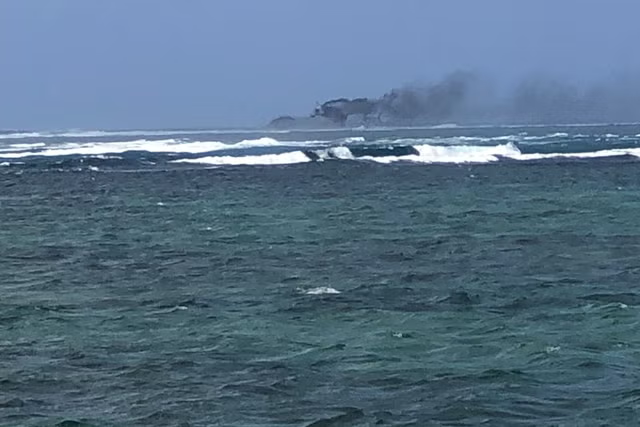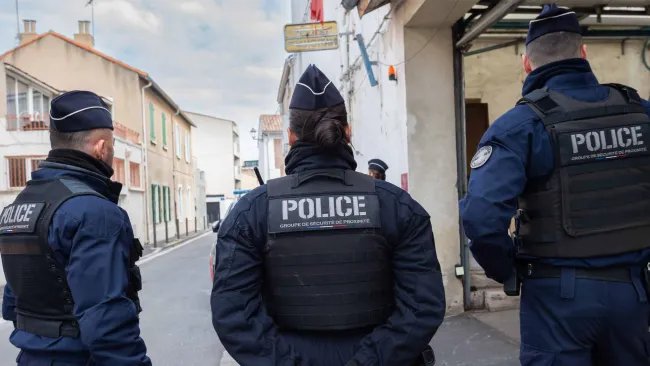Israel bombarded southern Beirut late on Saturday and early on Sunday, one day before it marks a year since the attacks orchestrated by Palestinian militant group Hamas that spiraled into a highly destructive war in Gaza and escalated tensions across Israel's northern border.
The Israeli Defense Forces (IDF) said on Sunday that its air force had carried out "a series of targeted strikes" on what it described as Lebanese-based Hezbollah weapons storage sites and "infrastructure" around Beirut.
Israel is around a week into a ground incursion into southern Lebanon after nearly a year of regularly exchanging fire with Hezbollah, which has been attacking the north of Israel in what it described as solidarity with Hamas.
The IDF echoed previous statements issued around its aerial strikes, saying it had warned the local population ahead of the attacks, and that Hezbollah had placed its weapons and military equipment "in the heart of the city of Beirut."
Eyewitnesses told Reuters that "massive consecutive strikes" rocked the south of Beirut in the early hours of Sunday. Lebanon's National News Agency reported "more than 30" strikes on southern suburbs, in what it called the "most violent night" since the start of Israeli operations. The south of the city has borne the brunt of Israeli airstrikes in recent days.
Israel has been at war with Hamas since the group, designated a terror organization by the U.S., launched its unprecedented attacks on southern Israel on October 7, 2023. The attacks killed around 1,200 people and approximately 250 people were taken hostage in Hamas-controlled Gaza.
Israel declared war on Hamas following the attack, with ground operations and intensive airstrikes laying waste to the Palestinian territory and sparking international humanitarian concerns for the its roughly 2 million inhabitants. Hamas-run health authorities in Gaza say more than 41,000 people have been killed since Israel vowed to eradicate the militant group after the October 7 attacks.
The simultaneous tensions between Israel and Hezbollah spiked in recent weeks, displacing hundreds of thousands of people on both sides of the border. Israel said it was launching "limited, localized and targeted ground raids" into southern Lebanon on October 1, in what it dubbed "Operation Northern Arrows."
Israel said on Saturday that nine of its soldiers had been killed in southern Lebanon since the start of the operation, the first since its forces pulled back from the country following the 2006 war between Hezbollah and Israel.
The Lebanese Health Ministry said on Sunday that 23 people had been killed and 93 more injured in Israeli attacks on Saturday.
The Israeli air force said on Sunday it had killed Khacher Ali Toil, a Hezbollah company commander operating close to the northern Israeli border, in airstrikes. Two other Hezbollah operatives who worked with Toil were killed earlier this week, the IDF said.
On Sunday, the IDF's Arabic-language spokesperson, Lieutenant Colonel Avichay Adraee, issued fresh warnings for residents of more than two dozen villages in southern Lebanon to evacuate "immediately" and move north of the Awali River. It sits more than 30 miles from the "blue line" marking the border between Israel and Lebanon.
Reuters, citing a Lebanese security official, reported that an Israeli strike on a Palestinian refugee camp near the northern Lebanese city of Tripoli had killed a Hamas member, as well as his wife and two children. The IDF said on Saturday that it had killed Muhammad Hussein Ali al-Mahmoud and Said Alaa Naif Ali, both described as part of Hamas' military wing, at an unspecified location.
Defense Minister Yoav Gallant said on Friday that Israel had "more surprises in store" for Hezbollah, describing the militant group as "receiving very severe blows, one after the other."
Israel killed Hezbollah chief Hassan Nasrallah more than a week ago after attacking Beirut's southern suburbs. On Saturday, Reuters, citing a Lebanese security source, reported that Nasrallah's likely successor, Hashem Safieddine, had been out of touch since Friday after an Israeli strike.
"We have more surprises in store, some of which have already been carried out and some of which will be carried out," Gallant said in remarks reported by Israeli media.
Disclaimer: The copyright of this article belongs to the original author. Reposting this article is solely for the purpose of information dissemination and does not constitute any investment advice. If there is any infringement, please contact us immediately. We will make corrections or deletions as necessary. Thank you.




